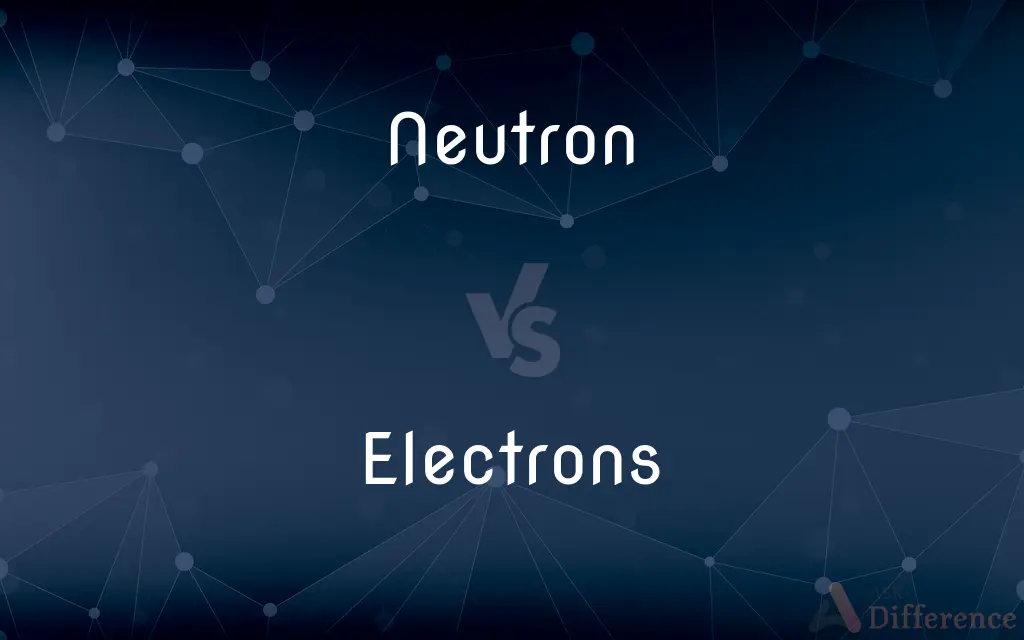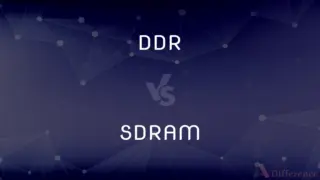Neutron vs. Electrons — What's the Difference?
Edited by Tayyaba Rehman — By Fiza Rafique — Published on December 26, 2023
Neutrons are neutral particles found in an atom's nucleus, while Electrons are negatively charged particles orbiting the nucleus. Both are fundamental atomic components.

Difference Between Neutron and Electrons
Table of Contents
ADVERTISEMENT
Key Differences
Neutrons are subatomic particles that exist within the nucleus of atoms. They are characterized by having no charge, meaning they are neutral. On the other hand, Electrons are also subatomic particles but carry a negative charge and exist outside the nucleus in specific orbits.
In terms of mass, Neutrons are relatively heavier, almost equivalent to protons. Electrons, by comparison, are much lighter. In fact, the mass of an electron is so small it's often considered negligible when calculating the atomic mass of an element.
The presence or absence of Neutrons can result in isotopes of the same element. This means that atoms of a given element can have varying numbers of neutrons. Electrons, in contrast, influence the chemical behavior of elements. The number of electrons in the outermost shell of an atom determines its reactivity and bonding capacity.
Neutrons play a vital role in holding the nucleus together. This is because the protons in the nucleus are positively charged and would repel each other without neutrons. Electrons, due to their negative charge, create an electric field around the atom, influencing interactions with other atoms.
Lastly, the discovery of Neutrons was pivotal in understanding nuclear reactions and processes. They participate in various nuclear reactions, including fission. Electrons, however, are central to electricity and the flow of electric current, given their charge and mobility.
ADVERTISEMENT
Comparison Chart
Charge
Neutral
Negative
Location
Nucleus of an atom
Orbits around the nucleus
Mass
Relatively heavy
Negligibly light
Role
Contributes to atomic weight; results in isotopes
Determines chemical reactivity; contributes to electricity
Interaction
Participates in nuclear reactions
Involved in electric and chemical interactions
Compare with Definitions
Neutron
Neutron has a similar mass to a proton but no charge.
The Neutron contributes significantly to the atom's overall mass.
Electrons
Electron is a negatively charged subatomic particle.
Atoms gain or lose Electrons to achieve stability.
Neutron
Neutron is a neutral subatomic particle located in an atom's nucleus.
The presence of an extra Neutron can result in a different isotope of an element.
Electrons
Electron flow results in electrical current.
Copper wires conduct electricity due to the movement of Electrons.
Neutron
Neutron plays a role in nuclear stability and reactions.
In nuclear reactors, Neutron absorption triggers certain nuclear reactions.
Electrons
Electron configurations dictate chemical bonding.
Elements share, donate, or accept Electrons during chemical reactions.
Neutron
Neutron was discovered as a key to understanding atomic structure.
The discovery of the Neutron helped clarify how the nucleus is composed.
Electrons
Electron has a minimal mass compared to protons and neutrons.
The mass of an Electron is so small it's almost negligible.
Neutron
Neutron can result in different isotopes of the same element.
Carbon-14 has two more Neutrons than Carbon-12.
Electrons
Electron orbits the nucleus in specific energy levels.
The outermost Electron shell determines an element's reactivity.
Neutron
The electrically neutral nucleon, a baryon composed of two down quarks and one up quark, which has a mass 1,839 times that of an electron, is stable when bound in an atomic nucleus, but has a mean lifetime of 886 seconds as a free particle. It is a basic component of all atomic nuclei except the protium isotope of hydrogen.
Electrons
A stable elementary particle in the lepton class having a negative electric charge of 1 elementary unit (about 1.602 × 10-19 coulombs) and a mass of about 9.11 × 10-28 grams. Electrons are found in shells orbiting the nuclei of atoms and can also move freely through space as cathode rays in a cathode-ray tube or as beta particles emitted by radioactive nuclei, or flow in a current through a conducting material impelled by an electric potential difference.
Neutron
(particle) A subatomic particle forming part of the nucleus of an atom and having no charge; it is a combination of an up quark and two down quarks.
Electrons
Plural of electron
Neutron
An elementary particle with 0 charge and mass about equal to a proton; enters into the structure of the atomic nucleus
Common Curiosities
What charge does a Neutron have?
A Neutron is neutral and has no charge.
How do Electrons influence an element's chemical behavior?
The configuration and number of Electrons in outer shells determine reactivity.
Where can you find Electrons in an atom?
Electrons orbit around the nucleus in specific energy levels.
Why are Neutrons essential for the nucleus?
Neutrons help stabilize the nucleus by offsetting repulsion between protons.
Do Electrons have a role in bonding?
Yes, Electrons, especially those in the outermost shell, participate in chemical bonds.
Which is heavier, a Neutron or an Electron?
A Neutron is significantly heavier than an Electron.
How do Electrons contribute to electricity?
Electricity is the flow of Electrons through a conductive medium.
Are there elements without Neutrons?
Yes, hydrogen-1, or protium, has no Neutrons in its nucleus.
What determines the electrical conductivity of a material?
The mobility and number of free Electrons determine conductivity.
Who discovered the Neutron?
James Chadwick is credited with the discovery of the Neutron in 1932.
Can the number of Neutrons vary in atoms of the same element?
Yes, varying Neutrons lead to different isotopes of the same element.
How do Electrons move in an atom?
Electrons orbit the nucleus in defined energy levels or shells.
Why don't Neutrons repel each other in the nucleus?
Strong nuclear forces in the nucleus overcome any potential repulsion between Neutrons.
What happens if an atom gains or loses Electrons?
It becomes an ion, either negatively charged (anion) if it gains Electrons or positively charged (cation) if it loses them.
Are Electrons involved in nuclear reactions?
Typically, no. Electrons are more involved in chemical reactions than nuclear ones.
Share Your Discovery

Previous Comparison
DDR vs. SDRAM
Next Comparison
Saturated Solution vs. Unsaturated SolutionAuthor Spotlight
Written by
Fiza RafiqueFiza Rafique is a skilled content writer at AskDifference.com, where she meticulously refines and enhances written pieces. Drawing from her vast editorial expertise, Fiza ensures clarity, accuracy, and precision in every article. Passionate about language, she continually seeks to elevate the quality of content for readers worldwide.
Edited by
Tayyaba RehmanTayyaba Rehman is a distinguished writer, currently serving as a primary contributor to askdifference.com. As a researcher in semantics and etymology, Tayyaba's passion for the complexity of languages and their distinctions has found a perfect home on the platform. Tayyaba delves into the intricacies of language, distinguishing between commonly confused words and phrases, thereby providing clarity for readers worldwide.












































